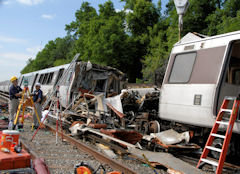 Washington Metro General Manager Paul J. Wiedefeld has been pushing for $15.5 billion in additional contributions from participating states and localities over the next 10 years, including $500 million in dedicated funding, to make the ailing commuter rail system safe and reliable.
Washington Metro General Manager Paul J. Wiedefeld has been pushing for $15.5 billion in additional contributions from participating states and localities over the next 10 years, including $500 million in dedicated funding, to make the ailing commuter rail system safe and reliable.
That request has set off serious jockeying between Maryland, Washington, D.C., and Virginia over who should pay how much, and which reforms the Metropolitan Washington Area Transit Authority (MWATA) must make before anyone trusts it with more money.
But at a recent MWATA board meeting, reports the Washington Post, Chairman Jack Evans enumerated $9.5 billion in anticipated needs not covered in Wiedefeld’s $15.5 billion figure.
Wiedefeld’s proposal “will only keep us where we are right now, which is not a good place to be,” Evans said. “What the region does, what the elected leadership, the business [community does] — they will seize on the easiest approach. So when he put out the number ‘500,’ everybody seized on ‘500,’ which gets you to $15 billion — which gets you to where you are today. Nobody wants to be where we are today.”
“We’re asking for the wrong number,” he said. “I think it was a mistake on behalf of the GM . . . to ask for the lower number.”
Bacon’s bottom line: Well, you have to appreciate Evans’ honesty. No one wants to hear that revitalizing the Metro will cost an astonishing $25 billion, not a mere $15 billion. As Virginians discuss how they will find their multibillion-dollar share of the Wiedefeld proposal, they should be acutely aware that they would be meeting only the Metro’s most urgent needs — “nonnegotiable” safety and system upgrades. They to ask themselves, will $15.5 billion be enough, or will it just paper over the problems?
Metro is “too big to fail.” Its collapse would throw the Washington region’s transportation system into turmoil, with endless repercussions for the economy and economic development. For instance, the Washington region would be an attractive location for the Amazon second headquarters in many ways, but the company is sure to ask itself, does it want to locate 50,000 employees in a region whose commuter rail system is falling apart and a proposed $15 billion fix merely preserves a deficient status quo?
Metro must be salvaged. But Virginia needs to hang tough and demand comprehensive management, labor, and governance reforms before coughing up hundreds of millions of dollars a year for a bail-out that may not accomplish much.


